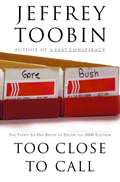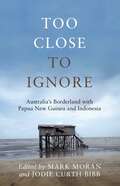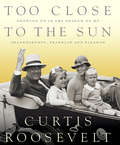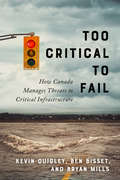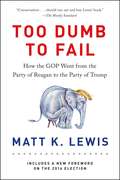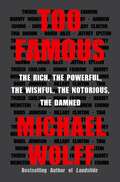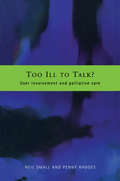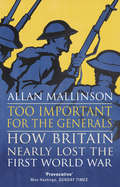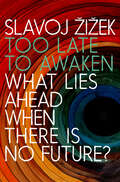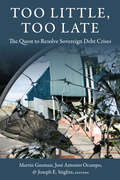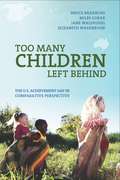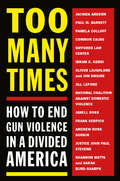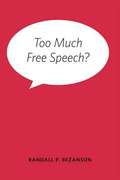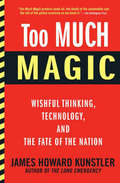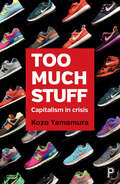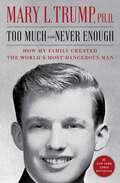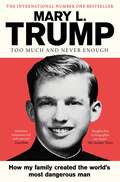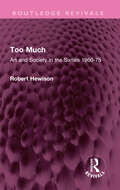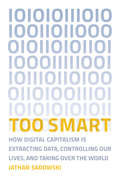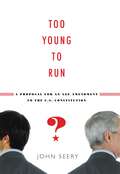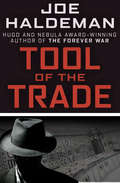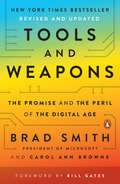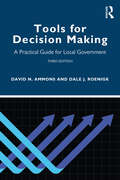- Table View
- List View
Too Close to Call: The Thirty-Six-Day Battle to Decide the 2000 Election
by Jeffrey ToobinFrom the best-selling author of A Vast Conspiracy and The Run of His Life comes Too Close to Call--the definitive story of the Bush-Gore presidential recount. A political and legal analyst of unparalleled journalistic skill, Jeffrey Toobin is the ideal writer to distill the events of the thirty-six anxiety-filled days that culminated in one of the most stunning Supreme Court decisions in history.<P><P> Packed with news-making disclosures and written with the drive of a legal thriller, Too Close to Call takes us inside James Baker's private jet, through the locked gates to Al Gore's mansion, behind the covered-up windows of Katherine Harris's office, and even into the secret conference room of the United States Supreme Court. As the scene shifts from Washington to Austin and into the remote corners of the enduringly strange Sunshine State, Toobin's book will transform what you thought you knew about the most extraordinary political drama in American history.<P> The Florida recount unfolded in a kaleidoscopic maze of bizarre concepts (chads, pregnant and otherwise), unfamiliar people in critically important positions (the Florida Supreme Court), and familiar people in surprising new places (the Miami relatives of Elián González, in a previously undisclosed role in this melodrama). With the rich characterization that is his trademark, Toobin portrays the prominent strategists who masterminded the campaigns--the Daleys and the Roves--and also the lesser-known but influential players who pulled the strings, as well as the judges and justices whose decisions determined the final outcome. Toobin gives both camps a treatment they have not yet received--remarkably evenhanded, nonpartisan, and entirely new.<P> The post-election period posed a challenge to even the most zealous news junkie: how to keep up with what was happening and sort out the important from the trivial. Jeffrey Toobin has now done this--and then some. With clarity, insight, humor, and a deep understanding of the law, he deconstructs the events, the players, and the often Byzantine intricacies of our judicial system. A remarkable account of one of the most significant periods in our country's history, Too Close to Call is endlessly surprising, frequently poignant, and wholly addictive.
Too Close to Ignore: Australia's Borderland with PNG and Indonesia
by Mark Moran Jodie Curth-BibbLess than five kilometres from Australia's most northern islands in the Torres Strait lies the southern coast of Papua New Guinea (PNG). The people living on the PNG side of the border along the South Fly coast live in abject poverty, with a near total absence of services and infrastructure. The disparity in income, housing and health outcomes when compared with their nearby neighbours and relatives in the Torres Strait Islands, is extreme. The border is the focus of a range of interventions by the Australian and Queensland governments, including border protection, quarantine, marine resource management, and infectious disease control, including an alarming outbreak of multi-drug resistant tuberculosis. Restrictions are increasing on trading, fishing and access to Australian services. However, questions remain as to whether this focus is having unintended consequences, increasing the destitution and frustration on the PNG side, in turn exacerbating the security threat to Australia. And as the Australian border hardens, the Indonesian border beckons. This book presents the results of three years of research into the unique social and political geography of the borderland. The Torres Strait Treaty between Australia and PNG serves to construct a complex institutional layering, a tiered economy and a hierarchy of identities between those South Fly villagers who have rights under the Treaty to travel into Australia, and those who do not. This creates a politics of expectation and frustration that permeates everyday life along the South Fly coast, through which development projects must navigate.
Too Close to the Sun: Growing Up in the Shadow of my Grandparents, Franklin and Eleanor
by Curtis RooseveltFDROCOs grandson describes his strange and wondrous coming-of-age in the Roosevelt White House?and the perils of a public childhood. "
Too Critical to Fail: How Canada Manages Threats to Critical Infrastructure
by Bryan Mills Ken Quigley Ben BissetIn the summer of 2013, just as a small town in Quebec was decimated due to a train derailment, heavy rainfall prompted thirty Alberta communities to declare a state of emergency. Whereas a SWAT team surrounded train conductor Thomas Harding and brought him to court where he was charged with the deaths of forty-seven in Quebec, Calgary mayor Naheed Nenshi emerged from the Alberta crisis as a folk hero. As the Lac-Mégantic train derailment and the flood in Alberta demonstrate, political, economic, legal, and cultural climates influence the way disasters are received and managed. In Too Critical to Fail, Kevin Quigley, Ben Bisset, and Bryan Mills identify the social context that shapes the Canadian government’s ability to prepare for and respond to emergencies. Using original research on natural disasters, pandemics, industrial failures, cyber-attacks, and terrorist threats, the authors evaluate the risk regulation regimes that monitor, interpret, and respond to failures in Canada’s critical infrastructure to limit their possibilities and consequences. More broadly, this book identifies key vulnerabilities and regulatory challenges for both the government and the private sector in mitigating threats to safety and security. Too Critical to Fail applies an investigative lens to the multiple and competing risks that the government balances to secure assets that enable modern civilization. Raising questions about Canadians’ ability to protect critical infrastructure and respond to threats, this book challenges the biases that determine who is held to account when the system fails.
Too Dumb to Fail: How the GOP Went from the Party of Reagan to the Party of Trump
by Matt K. LewisFrom a leading voice among young conservatives, an impassioned argument that to stay relevant the Republican Party must look beyond short-term electoral gains and re-commit to historic conservative values.In 1963 Richard Hofstadter published his landmark book Anti-Intellectualism in American Life. Today, Matt Lewis argues, America's inclination toward simplicity and stupidity is stronger than ever, and its greatest victim is the Republican Party. Lewis, a respected conservative columnist and frequent guest on MSNBC's Morning Joe, eviscerates the phenomenon of candidates with a "no experience required" mentality and tea party "patriots" who possess bluster but few core beliefs. Lewis traces the conservative movement's roots, from Edmund Burke to William F. Buckley, and from Goldwater's loss to Reagan's landslide victory. He highlights visionary thinkers who understood nuance and deep ideology and changed the course of the nation. As we approach the 2016 presidential election, Lewis has an urgent message for fellow conservatives: embrace wisdom, humility, qualifications, and inclusion--or face extinction.
Too Famous: The Rich, the Powerful, the Wishful, the Notorious, the Damned
by Michael WolffIf you can judge a book by its enemies, Too Famous could be an instant classic. Bestselling author of Fire and Fury and chronicler of the Trump White House Michael Wolff dissects more of the major monsters, media whores, and vainglorious figures of our time. His scalpel opens their lives, careers, and always equivocal endgames with the same vividness and wit he brought to his disemboweling of the former president. These brilliant and biting profiles form a mesmerizing portrait of the hubris, overreach, and nearly inevitable self-destruction of some of the most famous faces from the Clinton era through the Trump years. When the mighty fall, they do it with drama and with a dust cloud of gossip. This collection pulls from new and unpublished work—recent reporting about Tucker Carlson, Jared Kushner, Harvey Weinstein, Ronan Farrow, and Jeffrey Epstein—and twenty years of coverage of the most notable egomaniacs of the time—among them, Hillary Clinton, Michael Bloomberg, Andrew Cuomo, Rudy Giuliani, Arianna Huffington, Roger Ailes, Boris Johnson, and Rupert Murdoch—creating a lasting statement on the corrosive influence of fame. Ultimately, this is an examination of how the quest for fame, notoriety, and power became the driving force of culture and politics, the drug that alters all public personalities. And how their need, their desperation, and their ruthlessness became the toxic grease that keeps the world spinning.You know the people here by name and reputation, but it’s guaranteed that after this book you will never see them the same way again or fail to recognize the scorched earth the famous leave behind them.
Too Ill to Talk?: User Involvement in Palliative Care
by Penny Rhodes Neil SmallUser involvement has become an important part of health policy initiatives during the last decade, but how realistic is the concept and do all users want to be involved? This book brings the voices of people with serious illness, and those caring for them, into debate about how far health and social care services can reflect the views of users.Providing an overview of the literature on user involvement, the book looks at the policy and professional context within which user involvement is undertaken, in particular user involvement in pallative care. The authors discuss two key concepts - palliative care and empowerment - and analyse the role of self-help groups and new information and communication technologies in this context. The book focuses on the detailed narratives of people coping with three life-threatening illnesses - cystic fibrosis, multiple sclerosis and motor neurone disease - and in this way the views and experiences of the 'user' are brought into play to critique current policy and practice.Addressing a current health services issue in a refreshingly critical manner the text challenges the assumption that user involvement is either easy to achieve or that it is necessarily welcomed by all parties. It will be valuable reading for students on health studies courses, health professionals and policy makers in health and social care.
Too Important for the Generals: Losing and Winning the First World War
by Allan Mallinson‘War is too important to be left to the generals’ snapped future French prime minister Georges Clemenceau on learning of yet another bloody and futile offensive on the Western Front. One of the great questions in the ongoing discussions and debate about the First World War is why did winning take so long and exact so appalling a human cost? After all this was a fight that, we were told, would be over by Christmas. Now, in his major new history, Allan Mallinson, former professional soldier and author of the acclaimed 1914: Fight the Good Fight, provides answers that are disturbing as well as controversial, and have a contemporary resonance. He disputes the growing consensus among historians that British generals were not to blame for the losses and setbacks in the ‘war to end all wars’ – that, given the magnitude of their task, they did as well anyone could have. He takes issue with the popular view that the ‘amateur’ opinions on strategy of politicians such as Lloyd George and, especially, Winston Churchill, prolonged the war and increased the death toll. On the contrary, he argues, even before the war began Churchill had a far more realistic, intelligent and humane grasp of strategy than any of the admirals or generals, while very few senior officers – including Sir Douglas Haig – were up to the intellectual challenge of waging war on this scale. And he repudiates the received notion that Churchill’s stature as a wartime prime minister after 1940 owes much to the lessons he learned from his First World War ‘mistakes’ – notably the Dardanelles campaign – maintaining that in fact Churchill’s achievement in the Second World War owes much to the thwarting of his better strategic judgement by the ‘professionals’ in the First – and his determination that this would not be repeated.Mallinson argues that from day one of the war Britain was wrong-footed by absurdly faulty French military doctrine and paid, as a result, an unnecessarily high price in casualties. He shows that Lloyd George understood only too well the catastrophically dysfunctional condition of military policy-making and struggled against the weight of military opposition to fix it. And he asserts that both the British and the French failed to appreciate what the Americans’ contribution to victory could be – and, after the war, to acknowledge fully what it had actually been.
Too Late to Awaken: What Lies Ahead When There Is No Future
by Slavoj ZizekThe "most dangerous philosopher in the West" returns with a rousing and counterintuitive analysis of our global predicament.Žižek's most urgent and accessible book yet asks us all to imagine that catastrophe is a foregone conclusion—so that we can actually save the world.We hear all the time that we're moments from doomsday. Around us, crises interlock and escalate, threatening our collective survival: Russia's invasion of Ukraine, with its rising risk of nuclear warfare, is taking place against a backdrop of global warming, ecological breakdown, and widespread social and economic unrest. Protestors and politicians repeatedly call for action, but still we continue to drift towards disaster. We need to do something. But what if the only way for us to prevent catastrophe is to assume that it has already happened-to accept that we're already five minutes past zero hour?Too Late to Awaken sees Slavoj Žižek forge a vital new space for a radical emancipatory politics that could avert our course to self-destruction. He illuminates why the liberal Left has so far failed to offer this alternative, and exposes the insidious propagandism of the fascist Right, which has appropriated and manipulated once-progressive ideas. Pithy, urgent, gutting and witty Žižek&’s diagnosis reveals our current geopolitical nightmare in a startling new light, and shows how, in order to change our future, we must first focus on changing the past.
Too Little, Too Late: The Quest to Resolve Sovereign Debt Crises (Initiative for Policy Dialogue at Columbia: Challenges in Development and Globalization)
by Joseph E. Stiglitz José Antonio Ocampo Martin GuzmanThe current approach to resolving sovereign debt crises does not work: sovereign debt restructurings come too late and address too little. Though unresolved debt crises impose enormous costs on societies, many recent restructurings have not been deep enough to provide the conditions for economic recovery (as illustrated by the Greek debt restructuring of 2012). And if the debtor decides not to accept the terms demanded by the creditors, finalizing a restructuring can be slowed by legal challenges (as illustrated by the recent case of Argentina, deemed as "the trial of the century").A fresh start for distressed debtors is a basic principle of a well-functioning market economy, yet there is no international bankruptcy framework for sovereign debts. While this problem is not new, the United Nations and the global community are now willing to do something about it. Providing guidance for those who intend to take up reform, this book assesses the relative merits of various debt-restructuring proposals, especially in relation to the main deficiencies of the current nonsystem. With contributions by leading academics and practitioners, Too Little, Too Late reflects the overwhelming consensus among specialists on the need to find workable solutions.
Too Many Children Left Behind: The U.S. Achievement Gap in Comparative Perspective
by Jane Waldfogel Bruce Bradbury Elizabeth Washbrook Miles CorakThe belief that with hard work and determination, all children have the opportunity to succeed in life is a cherished part of the American Dream. Yet, increased inequality in America has made that dream more difficult for many to obtain. In Too Many Children Left Behind, an international team of social scientists assesses how social mobility varies in the United States compared with Australia, Canada, and the United Kingdom. Bruce Bradbury, Miles Corak, Jane Waldfogel, and Elizabeth Washbrook show that the academic achievement gap between disadvantaged American children and their more advantaged peers is far greater than in other wealthy countries, with serious consequences for their future life outcomes. With education the key to expanding opportunities for those born into low socioeconomic status families, Too Many Children Left Behind helps us better understand educational disparities and how to reduce them. Analyzing data on 8,000 school children in the United States, the authors demonstrate that disadvantages that begin early in life have long-lasting effects on academic performance. The social inequalities that children experience before they start school contribute to a large gap in test scores between low- and high-SES students later in life. Many children from low-SES backgrounds lack critical resources, including books, high-quality child care, and other goods and services that foster the stimulating environment necessary for cognitive development. The authors find that not only is a child’s academic success deeply tied to his or her family background, but that this class-based achievement gap does not narrow as the child proceeds through school. The authors compare test score gaps from the United States with those from three other countries and find smaller achievement gaps and greater social mobility in all three, particularly in Canada. The wider availability of public resources for disadvantaged children in those countries facilitates the early child development that is fundamental for academic success. All three countries provide stronger social services than the United States, including universal health insurance, universal preschool, paid parental leave, and other supports. The authors conclude that the United States could narrow its achievement gap by adopting public policies that expand support for children in the form of tax credits, parenting programs, and pre-K. With economic inequalities limiting the futures of millions of children, Too Many Children Left Behind is a timely study that uses global evidence to show how the United States can do more to level the playing field.
Too Many Times: How to End Gun Violence in a Divided America
by Melville HouseGuns in America have a history. The violence they cause came about from a series of decisions. To reverse them there is a series of solutions. This is your guide to them.Gun violence is a problem with many faces, but seemingly no solution. From mass shootings to deadly domestic abuse to police officers opening fire, it permeates American life. And yet it feels impossible to address. The lines are firmly drawn and the federal government has not passed any legislation to reduce gun ownership in over twenty-five years.That's why it's time to look at the issue differently. In this revelatory collection, gun violence in America is addressed from three angles: how gun violence affects us today, how we have gotten to this juncture legally and socially, and finally, what we can do to reduce and end gun violence in America. Too many lives are lost by gun fire--around 15,000 a year--but we do have the tools to address this crisis. Top journalists, organizations, and anti-gun-violence advocacy groups are represented here--from Pamela Coloff to Ibram X. Kendi to Everytown for Gun Safety and the Giffords Organization--to collect the most comprehensive, thoughtful and practical guide on gun violence in America. There are no deadlocks and no excuses--we have the tools to stop gun violence now.
Too Much Free Speech?
by Randall P. BezansonIn Too Much Free Speech?, Randall P. Bezanson takes up an essential and timely inquiry into the Constitutional limits of the Supreme Court's power to create, interpret, and enforce one of the essential rights of American citizens. Analyzing contemporary Supreme Court decisions from the past fifteen years, Bezanson argues that judicial interpretations have fundamentally and drastically expanded the meaning and understanding of "speech." Bezanson focuses on judgments such as the much-discussed Citizens United case, which granted the full measure of constitutional protection to speech by corporations, and the Doe vs. Reed case in Washington state, which recognized the signing of petitions and voting in elections as acts of free speech. In each case study, he questions whether the meaning of speech has been expanded too far and critically assesses the Supreme Court's methodology in reaching and explaining its expansive conclusions. Bezanson's measured approach and deep insights reveal the complexities of speech in the realms of human behavior and constitutional law. His wide-ranging analysis of relevant Supreme Court cases arms readers with the facts and perspectives necessary to reach independent conclusions about whether the Court's conduct befitted the independent judicial branch and to understand the consequences of its decisions for a representative democracy.
Too Much Magic: Wishful Thinking, Technology, and the Fate of the Nation
by James Howard KunstlerJames Howard Kunstler’s critically acclaimed and bestselling The Long Emergency, originally published in 2005, quickly became a grassroots hit, going into nine printings in hardcover. Kunstler’s shocking vision of our post-oil future caught the attention of environmentalists and business leaders alike, and stimulated widespread discussion about our dependence on fossil fuels and our dysfunctional financial and government institutions. Kunstler has since been profiled in The New Yorker and invited to speak at TED. In Too Much Magic, Kunstler evaluates what has changed in the last seven years and shows us that, in a post-financial-crisis world, his ideas are more relevant than ever. "Too Much Magic” is what Kunstler sees in the bright visions of a future world dreamed up by optimistic souls who believe technology will solve all our problems. Their visions remind him of the flying cars and robot maids that were the dominant images of the future in the 1950s. Kunstler’s image of the future is much more sober. With vision, clarity of thought, and a pragmatic worldview, Kunstler argues that the time for magical thinking and hoping for miracles is over, and the time to begin preparing for the long emergency has begun.
Too Much Stuff: Capitalism in Crisis
by Kozo YamamuraWhere has capitalism gone wrong? Why are advanced capitalist economies so sick and why do conventional policy solutions, such as reduced taxes and increased money supply, produce only wider income disparity and inequality? We now live in a new world in which we enjoy the highest living standard in history, acquiring ever more goods and services as necessary luxuries. Yet current policies only serve to expand public debt and exacerbate socio-economic inequality. In Too much stuff, Yamamura upends conventional capitalist wisdom to provide a new approach. He suggests the only way for capitalism and democracy to thrive is to increase investment to meet societal needs such as improving social safety nets, infrastructure, and better education and health care for all, but this means raising taxes. Both solutions-orientated and accessibly written, this book argues that this will help reduce the growing wealth gap which threatens global democracy. With fascinating examples from the US, Japan and Germany, as well as convincing evidence from across the Western world, this bold book challenges the economic orthodoxy and offers practical steps forward that we can all support.
Too Much and Never Enough: How My Family Created the World's Most Dangerous Man
by Mary L. TrumpIn this revelatory, authoritative portrait of Donald J. Trump and the toxic family that made him, Mary L. Trump, a trained clinical psychologist and Donald’s only niece, shines a bright light on the dark history of their family in order to explain how her uncle became the man who now threatens the world’s health, economic security, and social fabric. <p><p>Mary Trump spent much of her childhood in her grandparents’ large, imposing house in the heart of Queens, New York, where Donald and his four siblings grew up. She describes a nightmare of traumas, destructive relationships, and a tragic combination of neglect and abuse. She explains how specific events and general family patterns created the damaged man who currently occupies the Oval Office, including the strange and harmful relationship between Fred Trump and his two oldest sons, Fred Jr. and Donald. <p>A firsthand witness to countless holiday meals and interactions, Mary brings an incisive wit and unexpected humor to sometimes grim, often confounding family events. She recounts in unsparing detail everything from her uncle Donald&’s place in the family spotlight and Ivana’s penchant for regifting to her grandmother’s frequent injuries and illnesses and the appalling way Donald, Fred Trump’s favorite son, dismissed and derided him when he began to succumb to Alzheimer’s. <p>Numerous pundits, armchair psychologists, and journalists have sought to parse Donald J. Trump's lethal flaws. Mary L. Trump has the education, insight, and intimate familiarity needed to reveal what makes Donald, and the rest of her clan, tick. She alone can recount this fascinating, unnerving saga, not just because of her insider&’s perspective but also because she is the only Trump willing to tell the truth about one of the world’s most powerful and dysfunctional families. <p> <b>A New York Times Bestseller</b>
Too Much and Never Enough: How My Family Created the World's Most Dangerous Man
by Mary L. TrumpIn this revelatory, authoritative portrait of Donald J. Trump and the toxic family that made him, Mary L. Trump, a trained clinical psychologist and Donald’s only niece, shines a bright light on the dark history of their family in order to explain how her uncle became the man who now threatens the world’s health, economic security and social fabric. Mary Trump spent much of her childhood in her grandparents’ large, imposing house in New York, where Donald and his four siblings grew up. She describes a nightmare of traumas, destructive relationships and a tragic combination of neglect and abuse. She explains how specific events and general family patterns created the damaged man who currently occupies the Oval Office, including the strange and harmful relationship between Fred Trump and his two oldest sons, Fred Jr. and Donald. A first-hand witness, Mary brings an incisive wit and unexpected humour to sometimes grim, often confounding family events. She recounts in unsparing detail everything from her uncle Donald’s place in the family spotlight and Ivana’s penchant for regifting to her grandmother’s frequent injuries and illnesses and the appalling way Donald, Fred Trump’s favourite son, dismissed and derided him when he began to succumb to Alzheimer’s. Numerous pundits, armchair psychologists and journalists have sought to explain Donald Trump’s lethal flaws. Mary Trump has the education, insight and intimate familiarity needed to reveal what makes Donald, and the rest of her clan, tick. She alone can recount this fascinating, unnerving saga, not just because of her insider’s perspective but also because she is the only Trump willing to tell the truth about one of the world’s most powerful and dysfunctional families.
Too Much: Art and Society in the Sixties 1960-75 (Routledge Revivals)
by Robert HewisonFirst published in 1986, Too Much records the tumultuous period between 1960 and 1975 when, more than at any other time in history, the arts were a battleground for the conflicting forces of social change. With the new affluence of the Sixties the cultural conformism of the previous decade was rejected in favour of new forms of expression. Pop Art, pop music, fringe theatre and performance poetry helped to create the semi-mythological image of ‘Swinging London.’ The liberation ethic was feted as it masked the insecurities of a society in decline but, as a real political challenge to the status quo, it also led to conflict. The confrontation between official culture and the underground came in 1968, a year with its own mythical resonance. This book will be of interest to students of art, media studies and cultural studies.
Too Smart: How Digital Capitalism is Extracting Data, Controlling Our Lives, and Taking Over the World (The\mit Press Ser.)
by Jathan SadowskiWho benefits from smart technology? Whose interests are served when we trade our personal data for convenience and connectivity?Smart technology is everywhere: smart umbrellas that light up when rain is in the forecast; smart cars that relieve drivers of the drudgery of driving; smart toothbrushes that send your dental hygiene details to the cloud. Nothing is safe from smartification. In Too Smart, Jathan Sadowski looks at the proliferation of smart stuff in our lives and asks whether the tradeoff—exchanging our personal data for convenience and connectivity—is worth it. Who benefits from smart technology?Sadowski explains how data, once the purview of researchers and policy wonks, has become a form of capital. Smart technology, he argues, is driven by the dual imperatives of digital capitalism: extracting data from, and expanding control over, everything and everybody. He looks at three domains colonized by smart technologies' collection and control systems: the smart self, the smart home, and the smart city. The smart self involves more than self-tracking of steps walked and calories burned; it raises questions about what others do with our data and how they direct our behavior—whether or not we want them to. The smart home collects data about our habits that offer business a window into our domestic spaces. And the smart city, where these systems have space to grow, offers military-grade surveillance capabilities to local authorities. Technology gets smart from our data. We may enjoy the conveniences we get in return (the refrigerator says we're out of milk!), but, Sadowski argues, smart technology advances the interests of corporate technocratic power—and will continue to do so unless we demand oversight and ownership of our data.
Too Weak to Govern
by Peter HansonCan today's gridlocked Senate still perform the vital role in lawmaking entrusted to it by the Constitution? Too Weak to Govern examines the ability of the Senate majority party to tame the unruly Senate floor and pass the federal budget. Drawing on rigorous analysis and interviews with Senate leaders, it shows how the majority party manipulates the passage of appropriations bills to create massive "omnibus" spending bills. Omnibus bills help the majority party to overcome trouble on the floor and pass a budget at the cost of reducing transparency, accountability and the opportunity for senators to participate in lawmaking. Too Weak to Govern challenges traditional accounts of parties in Congress by demonstrating that the Senate majority party has more power to control the chamber than believed and that it is likely to use this power when it is weak and struggling to meet its goals.
Too Young to Run?: A Proposal for an Age Amendment to the U.S. Constitution
by John SeeryUnder the Constitution of the United States, those with political ambitions who aspire to serve in the federal government must be at least twenty-five to qualify for membership in the House of Representatives, thirty to run for the Senate, and thirty-five to become president. What is the justification for these age thresholds, and is it time to consider changing them? In this provocative and lively book, John Seery presents the case for a constitutional amendment to lower the age barrier to eighteen, the same age at which citizens become eligible to vote. He divides his argument into three sections. In a historical chapter, he traces the way in which the age qualifications became incorporated in the Constitution in the first place. In a theoretical chapter, he analyzes the normative arguments for office eligibility as a democratic right and liberty. And in a political chapter, he ruminates about the real-world consequences of passing such an amendment and the prospects for its passage. Finally, in a postscript, he argues that younger citizens in particular ought to be exposed to this fundamental issue in civics.
Too Young to Run?: A Proposal for an Age Amendment to the U.S. Constitution
by John SeeryUnder the Constitution of the United States, those with political ambitions who aspire to serve in the federal government must be at least twenty-five to qualify for membership in the House of Representatives, thirty to run for the Senate, and thirty-five to become president. What is the justification for these age thresholds, and is it time to consider changing them? In this provocative and lively book, John Seery presents the case for a constitutional amendment to lower the age barrier to eighteen, the same age at which citizens become eligible to vote. He divides his argument into three sections. In a historical chapter, he traces the way in which the age qualifications became incorporated in the Constitution in the first place. In a theoretical chapter, he analyzes the normative arguments for office eligibility as a democratic right and liberty. And in a political chapter, he ruminates about the real-world consequences of passing such an amendment and the prospects for its passage. Finally, in a postscript, he argues that younger citizens in particular ought to be exposed to this fundamental issue in civics.
Tool of the Trade
by Joe HaldemanBy the author of The Forever War: Caught between the USSR and the United States, a professor fights to create a better world Nicholas Foley survived the horrific siege of Leningrad. Since World War II ended, he has risen through the ranks of American academia to his current post as a respected university professor with a loving wife. His one secret: He works for the KGB. Foley acts as a sleeper agent for the Russians, pointing out potential talent for recruitment. This precarious position takes a turn for the deadly when Foley creates an invention that will change the world: a device that makes people obey orders, no matter what. The fate of the world is balanced on a razor&’s edge. As both superpowers pursue Foley, doing whatever they can to get their hands on his miraculous superweapon, he realizes he must choose a side. Nebula and Hugo Award winner Joe Haldeman is one of America&’s finest creators of science fiction, and Tool of the Trade is a masterful adventure. This ebook features an illustrated biography of Joe Haldeman including rare images from the author&’s personal collection.
Tools and Weapons: The Promise and the Peril of the Digital Age
by Brad Smith Carol Browne<P><P>From Microsoft's president and one of the tech industry's broadest thinkers, a frank and thoughtful reckoning with how to balance enormous promise and existential risk as the digitization of everything accelerates.Microsoft President Brad Smith operates by a simple core belief: When your technology changes the world, you bear a responsibility to help address the world you have helped create. <P><P>This might seem uncontroversial, but it flies in the face of a tech sector long obsessed with rapid growth and sometimes on disruption as an end in itself. While sweeping digital transformation holds great promise, we have reached an inflection point. The world has turned information technology into both a powerful tool and a formidable weapon, and new approaches are needed to manage an era defined by even more powerful inventions like artificial intelligence. <P><P>Companies that create technology must accept greater responsibility for the future, and governments will need to regulate technology by moving faster and catching up with the pace of innovation. <P><P>In Tools and Weapons, Brad Smith and Carol Ann Browne bring us a captivating narrative from the cockpit of one of the world's largest and most powerful tech companies as it finds itself in the middle of some of the thorniest emerging issues of our time. These are challenges that come with no preexisting playbook, including privacy, cybercrime and cyberwar, social media, the moral conundrums of artificial intelligence, big tech's relationship to inequality, and the challenges for democracy, far and near. <P><P>While in no way a self-glorifying "Microsoft memoir," the book pulls back the curtain remarkably wide onto some of the company's most crucial recent decision points as it strives to protect the hopes technology offers against the very real threats it also presents. There are huge ramifications for communities and countries, and Brad Smith provides a thoughtful and urgent contribution to that effort. <P><P><b>A New York Times Bestseller</b>
Tools for Decision Making: A Practical Guide for Local Government
by David N. Ammons Dale J. RoenigkThis book guides readers to the mastery of a wide array of practical analytic techniques useful to local governments. Written in an easy-to-read style with an emphasis on providing practical assistance to students, local government practitioners, and others interested in local government performance, this updated third edition features analytic methods selected for their relevance to everyday problems encountered in city and county governments. The authors outline a variety of practical techniques including the simplest that the fields of management, public administration, policy analysis, and industrial engineering have to offer. Each analytic technique is introduced in the context of a fictitious case presented over a few pages at the beginning of that technique’s chapter. Contents include demand analysis, work distribution analysis, process flow-charting, inflation adjustments, annualizing capital costs, staffing analysis, identifying full costs of a program or service, present value analysis, life-cycle costing, lease/buy analysis, cost-effectiveness analysis, benchmarking analysis, and more. This updated third edition features a dramatic expansion of Excel-based applications, plus templates and exercises accompanying many of the chapters and available online. New chapters prepare readers to: • use statistical tests to identify significant differences in performance averages; • construct Pareto charts; • develop cause-and-effect diagrams; • prepare control charts; • detect possible discrimination in hiring and appointment practices; and • present analytic evidence more effectively. This book is an essential resource for students and instructors of public administration courses on analysis, methods, evaluation, productivity improvement, and service delivery. Online resources for this book, including Excel templates, are available at https://toolsfordecisionmaking.sog.unc.edu
